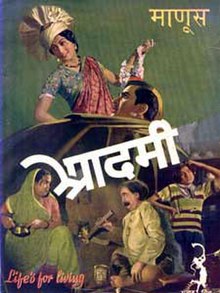Manoos
| Manoos | |
|---|---|

Film Poster
|
|
| Directed by | V. Shantaram |
| Produced by | Prabhat Film Company |
| Written by | A. Bhaskarrao |
| Starring |
Shahu Modak Shanta Hublikar Sundara Bai Ram Marathe |
| Music by | Master Krishnarao |
| Cinematography | V. Avdhoot |
|
Production
company |
|
|
Release date
|
|
|
Running time
|
164 minutes |
| Country | India |
| Language | Marathi |
Manoos, also called Life's for Living, is a 1939 Indian Marathi social melodrama film directed by V. Shantaram. The movie then remade in Hindi as Aadmi. The film was based on a short story called "The Police Constable". The story was by A. Bhaskarrao with screenplay and dialogue by Anant Kanekar. The cinematographer was V. Avadhoot and the music was composed by Master Krishna Rao with lyrics by Kanekar. The cast included Shahu Modak, Shanta Hublikar, Sundara Bai, Ram Marathe, Narmada, Ganpatrao, Raja Paranjpe.
Manoos, termed as a "reformist social melodrama", involved the subject of an honest policemen's love for a prostitute and his attempts to rehabilitate her, and the rejection by society.
Shahu Modak plays the role of an honest policeman, Ganpat, who on his beat round meets a prostitute, Maina (Shanta Hublikar). He saves her when there is a police raid on the sex-workers. Over their several meetings he falls in love with her. He attempts Maina's rehabilitation by getting her out of that atmosphere by marrying her. In this endeavour he takes her to meet his mother to get her approval. The social disapproval brings misery. Modak resorts to drinks and descends into alcoholism. Maina is driven by guilt and is unable to bear the jeers and snide remarks. She finally kills her evil uncle and refuses Ganpat's help when arrested.
Shantaram was "admired" as a visionary for his social reformist films like Padosi or Shejari in Marathi about Hindu/Muslim unity, Aadmi/Manoos for the topic of alcoholism as well as upliftment of women, and Duniya Na Mane/Kunku for women's emancipation. The film completed 75 years in 2014, and still "remains fresh". The film is stated to be "classic" along with his other two films Kunku (1937) and Padosi (Shejari) (1941), and cited as one of the "best social films" that became successful. It was appreciated by the audiences and commended by Charlie Chaplin.
...
Wikipedia
